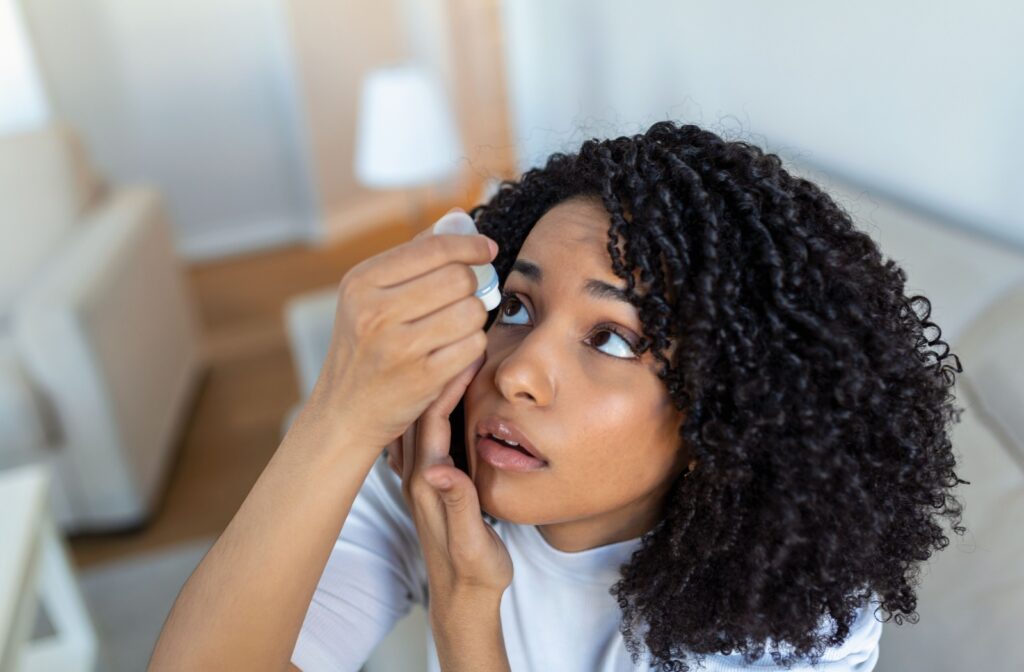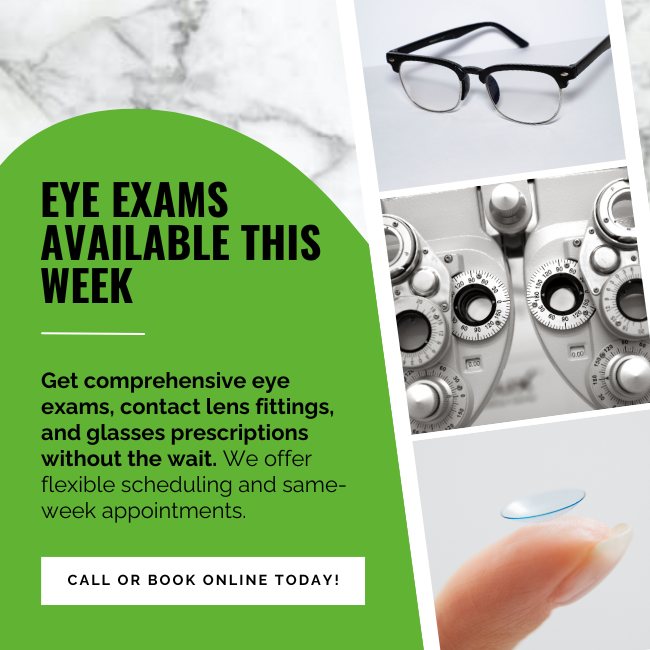Many contact lens wearers experience dryness, irritation, or even blurry vision due to insufficient moisture in their lenses throughout the day. Your contacts may be drying out so fast for several reasons, including:
- Dry air and air conditioning
- Over-wearing your contacts
- Dry eye syndrome
Unfortunately, there is rarely a one-size-fits-all answer to why you’re experiencing dryness. So, if you can’t get relief from an over-the-counter (OTC) solution like lubricating eye drops, it’s essential to see your eye doctor for an examination.
Key Takeaways
- Contact lenses can dry out due to environmental factors, screen time, or poor lens habits.
- Over-wearing lenses, improper storage, and skipping fresh solution can worsen dryness.
- Dry eye syndrome, certain medications, and dehydration may also contribute.
- Proper lens care, rewetting drops, hydration, and the right lens type can improve comfort.
- Ongoing irritation or blurred vision should be evaluated by your optometrist.
Why Do My Contacts Dry Out?
If you’re having trouble keeping your contact lenses comfortable, it’s important to identify the root cause. Several factors—ranging from your environment to your health—can lead to excessive lens dryness. Understanding these can go a long way toward addressing the issue.
Environmental Factors
Certain environmental conditions impact the moisture levels of your contact lenses.
Dry Air & Air Conditioning
Spending time in air-conditioned rooms or environments with dry air can strip away moisture from your lenses and eyes. Similarly, indoor heating during colder months creates a drier atmosphere that can exacerbate the problem.
Wind & Dust
Outdoor elements like wind and dust can quickly dry out your contacts and irritate your eyes. Whether walking on a windy day or facing dusty city streets, your environment can contribute to discomfort.
Prolonged Screen Time
Staring at screens (phones, computers, etc.) for extended periods often causes us to blink less, frequently leading to digital eye strain. Less blinking also means your eyes aren’t naturally rehydrating, leading to faster lens dehydration.
Personal Habits
Sometimes, dry contacts result from less-than-ideal habits or practices.
Over-Wearing Your Contacts
Wearing your lenses longer than recommended—whether daily, weekly, or monthly—can cause them to lose moisture and become uncomfortable.
Improper Storage
Failing to store your lenses properly in fresh contact lens solution can result in residue build-up, diminishing their moisture retention.
Skipping Regular Lens Solution Changes
Reusing the same storage solution day after day is a recipe for dryness and irritation, and it increases the risk of infection.
Health Conditions & Medications
Sometimes, the problem isn’t your contacts—it’s your eyes or medication.
Dry Eye Syndrome
People with chronic dry eye syndrome naturally produce lower-quality tears, which can cause contact lenses to dry out more quickly.
Medications
Certain medications, such as antihistamines, antidepressants, or decongestants, may reduce tear production, leading to drier lenses and eyes.

Other Underlying Conditions
Autoimmune diseases, hormonal changes, or even simple dehydration from not drinking enough water can all impact the moisture levels in your eyes.
Tips to Prevent & Manage Dry Contacts
The good news is that you can take proactive steps to keep your contacts moist and enjoy a more comfortable wearing experience.
Prioritize Proper Hygiene & Lens Care
Maintaining good lens hygiene is the foundation of healthy, comfortable contact wear:
- Wash your hands thoroughly before handling your lenses
- Always use a fresh contact lens solution
- Clean your lenses with care to remove debris and maintain hydration
- Dispose of your lenses according to the schedule recommended by your optometrist.
Use Rewetting Drops & Other Moisturizing Solutions
Rewetting drops or artificial tears are a lifesaver for contact lens wearers struggling with dryness. Choose contact-lens-safe eye drops to restore moisture throughout the day. Look for preservative-free options to reduce any risk of irritation. Use them as needed, especially in dry or windy conditions.
Adjust Your Environment
Minor adjustments to your surroundings can make a big difference in preventing contact lens dryness. Use a humidifier indoors to counteract dry air from heating or air conditioning systems. Take regular breaks from screens to blink more frequently and reduce eye strain.
Stay Hydrated & Healthy
Keeping your body hydrated can improve tear production and moisten your lenses. Drink plenty of water throughout the day to prevent eye dryness caused by dehydration. Eat a diet rich in omega-3 fatty acids (e.g., salmon, chia seeds, walnuts), which help support tear production.
When to Stop Wearing Your Contacts Immediately
While occasional dryness can often be managed with simple adjustments, some symptoms should never be ignored. Remove your contact lenses right away and seek professional care if you experience:
- Persistent pain or sharp discomfort
- Redness that doesn’t improve after removing lenses
- Light sensitivity
- Sudden blurry or reduced vision
- Discharge from the eye
These symptoms could signal an infection, corneal abrasion, or another serious eye condition. Continuing to wear your lenses in these situations can worsen the problem and potentially threaten your vision. When in doubt, take your lenses out and consult your optometrist for guidance.
Remember: discomfort is your eyes’ way of telling you something isn’t right. Addressing issues early can prevent long-term complications and keep your eyes healthy.
Know When to Seek Professional Advice
If you continue to experience persistent contact lens dryness, schedule an appointment with your optometrist to rule out underlying conditions like dry eye syndrome or allergies.
Clear Vision & Comfortable Contacts from Your Eye Doctor
Drying, irritating contact lenses can be an obstacle, but with the proper knowledge and practices, you can reclaim the comfort they’re meant to provide. Taking steps like improving your lens care routine, choosing the right lenses for your needs, and investing in moisturizing solutions can make a world of difference in maintaining clear and comfortable vision.
Contact our team at River City Vision Center to book an eye exam today. One of our experienced eye doctors can examine your eyes, review your symptoms, and offer tailored treatment advice for your dry eyes and contact lenses.





